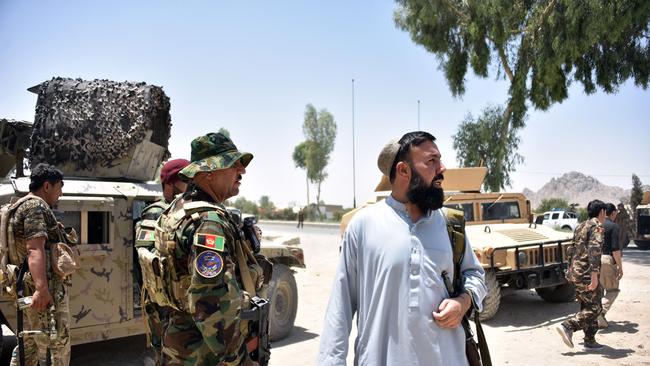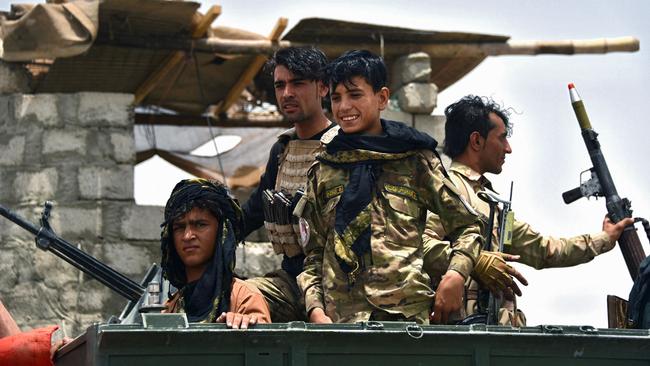Piers Akerman: Australia should help our friends in Afghanistan
If we value our integrity, we have no choice but to help our Afghan friends, Piers Akerman writes.
Opinion
Don't miss out on the headlines from Opinion. Followed categories will be added to My News.
In this time of Covid our leaders call upon us to show Australian spirit as no doubt they will through the Brisbane Olympics, still a decade away.
But Aussie character doesn’t look all that smart currently.
We have, half-heartedly, pointed out that China has yet to co-operate with any real investigation of the origin of the virus which has crippled our economy and killed several million people globally.
More recently, we have joined a coalition of over 30 nations in naming China as the main culprit of the Microsoft Exchange cyber attack discovered earlier this year.
That cyber attack and espionage was carried out by China’s Ministry of State Security — the lead intelligence agency of the People’s Republic of China.
For merely suggesting that the origins of the virus need to be identified we have been viciously targeted by President-for-Life Xi’s authoritarian Communist regime but our suffering is as nothing to the horror being visited upon those who until most recently we have been defending and expending lives and treasure to protect.

The Afghan people to whom the presence of our troops over the past 20 years represented a visible and active force giving hope in a nation blighted for centuries by ignorance, tribalism and a ferocious and evil fundamentalist interpretation of Islam.
Less than a week after the 9/11 terrorist attacks on the US in 2001, Prime Minister John Howard’s government invoked the ANZUS Treaty for the first time since it was signed in 1951.
Citing the terrorist attacks, the mutual defence clauses were invoked on September 14, 2001, and we were committed to supporting the US Operation Enduring Freedom in its pursuit of international terrorism.
Operation Slipper, our contribution, began that October and after undergoing many changes, was succeeded by Operation Highroad, which was brought to a close with the withdrawal of the last troops last month.
We also closed our embassy in Kabul, leaving those Afghans who had worked with and for us, believing in our commitment to a better world, that we would stay the distance.
As the monstrously malevolent Taliban now seem unstoppable and the collapse of the Afghan government inevitable, those we relied upon have been left in the lurch.
With no diplomatic representation in the country, Afghans applying for visas to come to Australia are facing a nightmare of blame-shifting bureaucracies, form-filling and almost non-existent communications.

One of these is the former governor of Herat province, Sayed Fazlullah, with whom I spoke Thursday.
He is one of the bravest of the brave and because of his bravery he is a Taliban target.
He worked against the Russians when they occupied Afghanistan and worked with NGOs to secure a more enlightened future for his country.
He has endured the horror of being kidnapped, his son and grandson now live in Australia for their safety and only now has he agreed to leave the country in which he has invested his life.
“We live in danger, the situation is very bad,” he told me. “No-one is safe, journalists, women are all targeted, it is very bad.”
The people, he said, are taking up guns against each other, it is becoming a civil war.
Thousands of families are moving from the country to the city as villages and now Kandahar, the nation’s second largest city, fall to the Taliban.
Beheadings, whippings, limbs chopped off, the same vile atrocities that al Quaeda and ISIS visited upon their enemies in Syria are being practised as the Taliban advance on Kabul.
The so-called peace talks in Doha have a surreal quality. The Taliban demand the release of all prisoners before they will agree to a ceasefire and the government representatives want a ceasefire before a prisoner release.
The Taliban, however, have never observed the conditions of ceasefire they have agreed to. They sent in their suicide bombers during the talks.
We did not defeat the Taliban but we did help hold the line against their brutality.
Morally, we owe visa assistance now to those who helped us offer a better life to their people, particularly the young women who were given the opportunity to attend school.
We let down our Vietnamese allies. If we value our integrity, we have no choice but to help our Afghan friends.





